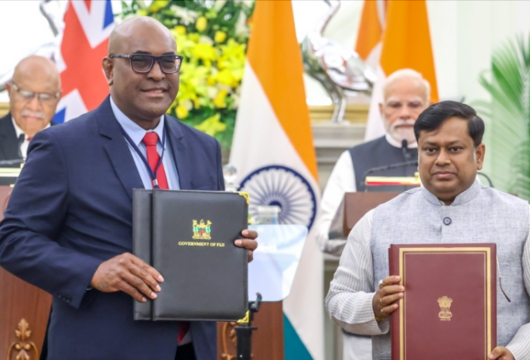India Extends Climate Support to Fiji Amid Shared Aspirations
In a significant diplomatic stride towards strengthening partnerships in the Pacific, Prime Minister Narendra Modi announced India’s commitment to provide climate support to Fiji, reinforcing disaster preparedness and resilience against climate change threats. The announcement came after detailed discussions with Fijian Prime Minister Sitiveni Ligamamada Rabuka at Hyderabad House, New Delhi, on August 25, 2025.
Although separated by oceans, Modi highlighted that India and Fiji’s aspirations “sail in the same boat,” pointing to shared vulnerabilities and ambitions in building secure, sustainable futures. The bilateral engagement resulted in the signing of seven agreements, covering diverse sectors including disaster response, defence, maritime security, and development cooperation.
PM Modi and Fiji’s Rabuka Sign Seven Agreements, Strengthening Defence and Disaster Cooperation
The meeting placed climate change and disaster management at the heart of Indo-Fijian cooperation. Acknowledging Fiji’s acute exposure to rising sea levels, cyclones, and natural disasters, Modi assured support through training, equipment, and joint action plans designed to bolster Fiji’s capacity to respond effectively.
“Climate change is a threat for Fiji; we will help it deal with disaster response,” PM Modi declared, reaffirming India’s leadership role in climate diplomacy. This move underscores India’s increasing visibility as a trusted partner for island nations vulnerable to climate shocks.
Beyond climate support, the leaders emphasised cooperation in the defence and security domain, particularly maritime security in the Indo-Pacific. With China deepening its footprint in the Pacific, India’s collaboration with Fiji gains strategic weight.
Modi announced that India would provide both training and equipment support to enhance Fiji’s maritime capabilities. This includes initiatives to protect critical sea lanes, enhance surveillance, and maintain regional stability. The Indo-Fijian partnership aligns with India’s vision of a free, open, inclusive, and secure Indo-Pacific.
The signing of seven key agreements marked a new phase of engagement between the two nations. While the details span multiple sectors, the thrust remains on sustainable development, security, and people-to-people connections.
Among them are:
- Disaster response and climate resilience initiatives
- Maritime defence and security cooperation
- Capacity building programs for Fijian institutions
- Partnerships in renewable energy and sustainability
These agreements reflect not only immediate commitments but also a long-term roadmap for shared growth and security.
Global South Priorities
In his remarks, Modi underlined India’s broader vision of supporting the Global South, reinforcing that India’s partnerships extend beyond transactional ties. “We are partners in building a world order where the independence, ideas, and identity of the Global South are respected,” he said.
This aligns with India’s proactive diplomacy in recent years, positioning itself as a reliable partner for developing nations navigating challenges of climate change, economic inequality, and geopolitical shifts.
The India-Fiji relationship carries deep historical resonance. Since 1879, when Indian labourers were taken to Fiji under the British indenture system, cultural and familial bonds have flourished across generations. Today, nearly 40% of Fiji’s population traces its roots to India, making people-to-people ties one of the strongest bridges between the nations.
Prime Minister Rabuka’s visit to India—his first since assuming office—follows President Droupadi Murmu’s visit to Fiji last year, signalling consistent high-level exchanges. His itinerary also includes delivering a lecture at Sapru House on August 26, organised by the Indian Council of World Affairs, before concluding his trip on August 27.
Strategic Significance in the Indo-Pacific
Fiji’s location in the Pacific places it at the centre of emerging strategic competition. India’s proactive engagement in offering climate support, disaster response, and maritime security collaboration reflects a nuanced approach: strengthening ties with smaller island states while advancing its Indo-Pacific vision.
Observers note that the partnership provides mutual benefits—Fiji gains resources and expertise to counter existential threats from climate change, while India enhances its diplomatic footprint in the Pacific at a time of shifting global alliances.
Climate Support as Diplomacy
The highlight of this engagement remains climate support. For Fiji, which regularly experiences devastating cyclones, rising sea levels, and saltwater intrusion affecting agriculture, external assistance is not just welcome—it is essential. For India, extending this support reaffirms its role as a responsible global actor with the capacity to deliver tangible climate solutions.
This cooperation echoes India’s broader international commitments under initiatives like the International Solar Alliance and the Coalition for Disaster Resilient Infrastructure, both of which emphasize climate-friendly growth models for vulnerable nations.
The visit and agreements underscore a forward-looking agenda between India and Fiji. By combining climate support, defence cooperation, and historical people-to-people ties, the two nations are scripting a renewed partnership based on trust and shared destiny.
As Prime Minister Modi remarked, despite being oceans apart, India and Fiji are united by common aspirations—a sustainable, secure, and prosperous future. The agreements signed during this visit will serve as milestones in translating these aspirations into action.
For more in-depth analysis and inspiring climate news, click here.

